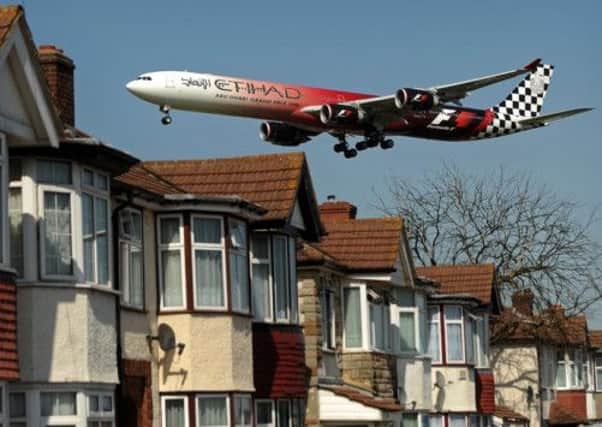Aircraft noise link to heart disease deaths


Researchers at Imperial College London and King’s College London compared data on aircraft noise with hospital admissions and mortality rates among 3.6 million people living near Heathrow airport.
They found the risks were 10 per cent to 20 per cent higher in areas with the highest levels of aircraft noise against the areas with least noise.
Advertisement
Hide AdAdvertisement
Hide AdPrevious research has found links between living in a noisy environment and a risk of high blood pressure, but few studies have looked at stroke, heart disease and circulatory disease.
The findings, published in the British Medical Journal, raise the possibility that aircraft noise may be a contributing factor to these conditions, but the researchers said more work is needed to establish the exact relationship between noise and ill health.
The study covered 12 London boroughs and nine districts outside London where aircraft noise exceeds 50 decibels – about the volume of a normal conversation in a quiet room.
The whole study area was divided into 12,110 small areas, each with a population of around 300.
For each small area, the researchers looked at noise level data from 2001, provided by the Civil Aviation Authority, and hospital admissions and deaths from 2001-05.
Dr Anna Hansell, from the school of public health at Imperial, the lead author of the study, said: “These findings suggest a possible link between high levels of aircraft noise and risk of heart disease and stroke.
“The exact role that noise exposure may play in ill health is not well established. However, it is plausible that it might be contributing, for example by raising blood pressure or by disturbing people’s sleep.”
Professor Paul Elliott, the senior author of the study and director of the Medical Research Council, where the study was conducted, said: “From this type of study, we can’t say for certain that aircraft noise is responsible for the increased heart disease and stroke risk in these communities as there are other possible explanations.”
Advertisement
Hide AdAdvertisement
Hide AdHe added: “It’s worth bearing in mind that there are many other factors that are known to have important influences on an individual’s risk of heart disease and stroke, such as diet, smoking, lack of exercise and medical conditions such as raised blood pressure and diabetes.
“However, our study does raise important questions about the potential role of noise on cardiovascular health, which needs further study.”
Matt Gorman, Heathrow’s director of sustainability, said steps had been taken to address problems from noise pollution.
He said: “We recognise that, as well as bringing huge benefits to the UK and the local communities, an airport of the size and importance of Heathrow can have downsides for people living nearby.
“We are already taking significant steps to tackle the issue of noise by charging airlines more for noisier aircraft, offering insulation and double glazing to local residents, and are working with noise campaigners to give people predictable periods of respite from noise.”
A Westminster government spokesman said: “There have been a number of studies that link health and exposure to noise so we take this issue very seriously.
“The number of people affected by high levels of noise around Heathrow has been falling for years due to improvements in aviation technology, better planning of flight paths and other factors. We would expect to see this trend continue.”